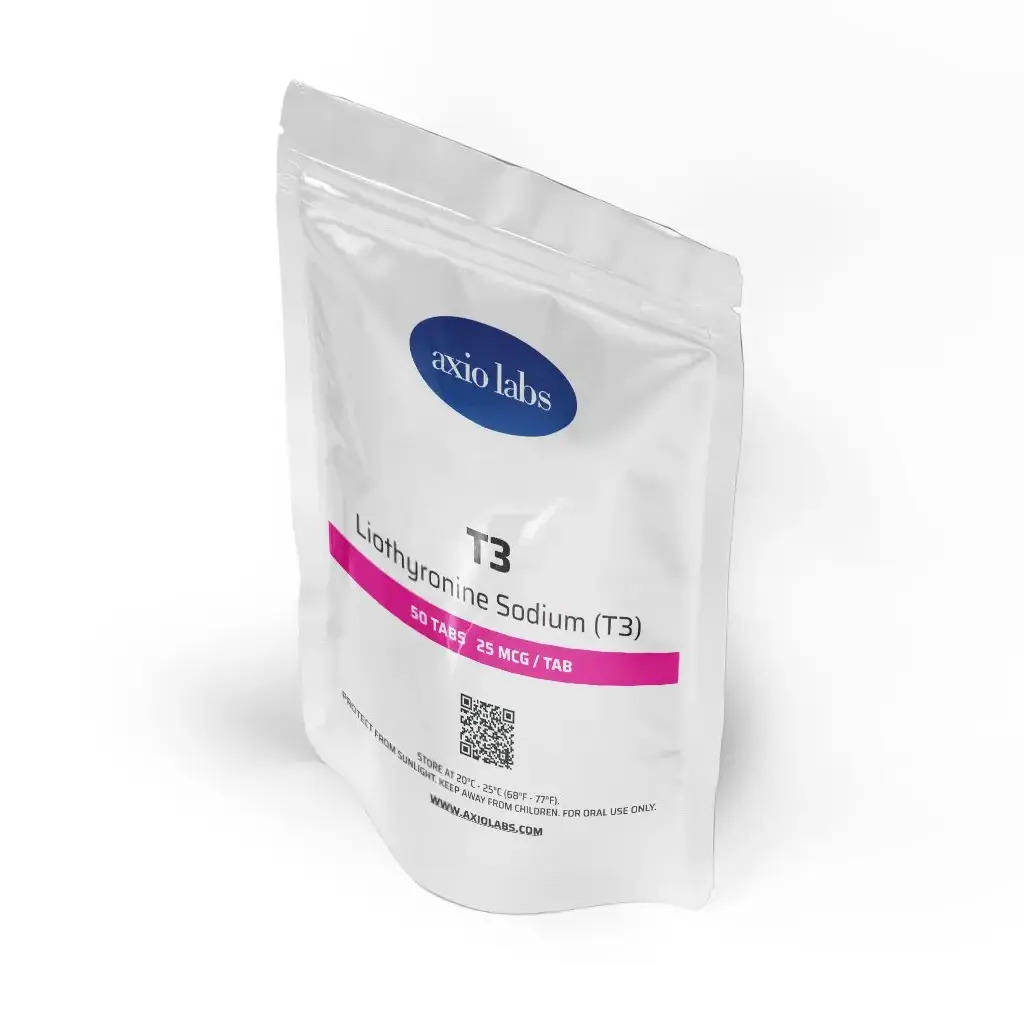


For Oral Administration
Composition: Liothyronine Sodium
Dosage: 25 mcg/tablet
Unit: 50 Tablets
Manufactured by Axiolabs
T3 by Axiolabs contains Liothyronine Sodium 25 mcg per tablet and is supplied in a 50-tablet pack. Liothyronine is a synthetic form of the active thyroid hormone triiodothyronine (T3) that plays a central role in metabolic rate, thermogenesis, and macronutrient utilization. In performance circles, T3 is discussed as an advanced tool during cutting phases to enhance energy expenditure—always under strict medical supervision. This page is educational and not a substitute for professional advice.
Thyroid hormones regulate how efficiently your body creates energy from food. T3, the more active thyroid hormone, binds to nuclear receptors and influences gene transcription that governs metabolic rate, mitochondrial biogenesis, and lipid/carbohydrate handling. When T3 is properly balanced, metabolism runs smoothly; too little can feel like the "brakes" are on, too much can feel like the "gas pedal" is floored. Because liothyronine is potent and fast-acting, experienced users emphasize conservative planning and objective monitoring.
For a concise medical overview of liothyronine's indications, contraindications, and safety considerations, see the MedlinePlus entry for Liothyronine. While focused on clinical use, it explains core mechanism and precautions clearly.
Reality check: T3 does not replace diet, training, sleep, or stress control. It can magnify a well-built plan—but it cannot fix a poor one.
Experienced users who involve clinicians typically anchor their approach to data. They begin at conservative intake levels, track objective markers, and proceed only if the basics are on point:
Many advanced prep strategies feature multiple moving parts. Each addition increases complexity and potential risk, so medical oversight is non-negotiable. The below are informational themes commonly discussed:
T4 (Levothyroxine) is a prohormone that the body converts into T3. T3 (Liothyronine) is active and faster-acting. Some clinicians prefer T4 for steadiness; others may consider T3 when rapid, precise adjustments are needed. In practice, safety, labs, and symptoms drive the choice—not theory alone.
Potential experiences discussed with T3 include elevated heart rate, heat intolerance, anxiety/restlessness, GI upset, sleep disturbance, and, if misused, muscle loss. People with cardiovascular or endocrine conditions should avoid thyroid manipulation unless explicitly directed by a physician.
This content is informational and not medical advice. Use only under the supervision of a licensed healthcare professional and in accordance with all applicable laws and regulations in your area.
T3 contains Liothyronine Sodium, the active thyroid hormone triiodothyronine. In performance contexts it's researched for advanced cutting phases under medical supervision.
T4 is a prohormone converted to T3 in the body. T3 is the active form and acts faster. Choice depends on labs, goals, and clinician guidance—not preference alone.
Some advanced users stack T3 with non-stimulant compounds. Combining with stimulants increases risk and should only be done with professional oversight and careful monitoring.
Potential effects include elevated heart rate, heat intolerance, anxiety, GI upset, and sleep issues. If severe or persistent, discontinue and consult a licensed professional promptly.
After extended use, many clinicians recommend a gradual taper rather than abrupt cessation. Always discuss the exit plan and timing with your healthcare provider.
Please log in to write T3 25 mcg (50 Tablets) review.

For Oral Administration
Composition: Clenbuterol Hydrochloride
Dosage: 40 mcg/tablet
Unit: 100 Tablets
Manufactured by Axiolabs
Laboratory Test: View Lab Report